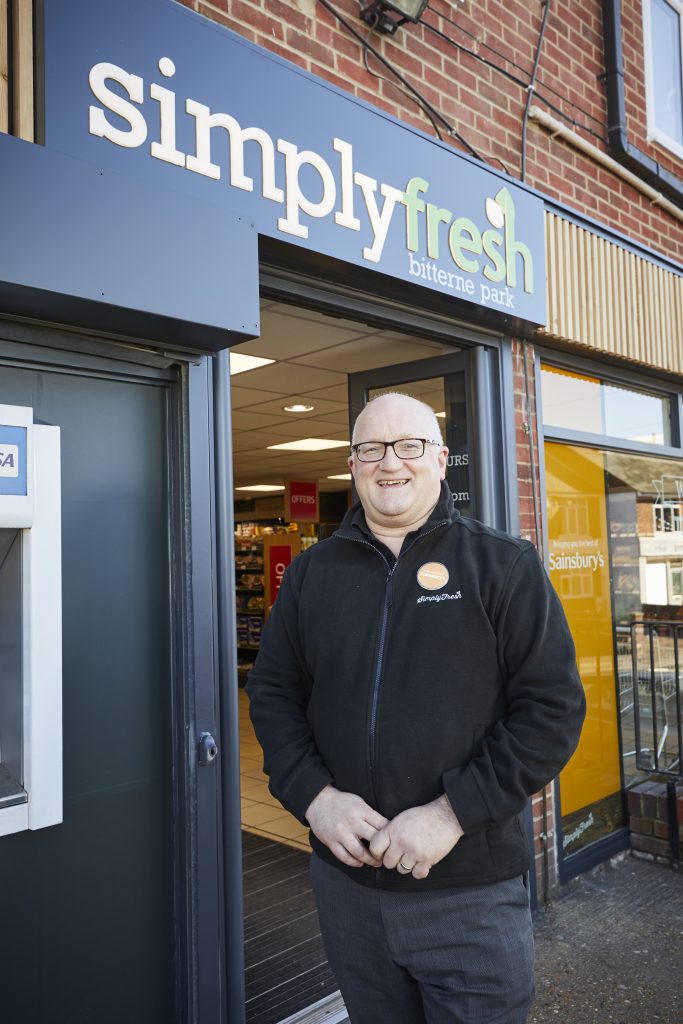His grandparents ran post offices and newsagents and his father followed them into the same trade. Bassett, now 53, came as the third generation into the family business himself when his father bought a store in Weymouth in Dorset, where the younger Bassett was already working for the now defunct chain Normans, which used to operate stores throughout the south-west of England.
Store prospects
If there was one blip in Bassett Jnr’s seemingly inevitable path into retailing, it was that he did a hotel and catering course after school – at South Devon technical college in Torquay – but it turned out that hospitality could not hold him.
He went to work for Normans and by the time he was 28, he was in his father’s Weymouth shop. Bassett now runs five stores across the South-west, including one in Bitterne Park, Southampton, which he turned into a Simply Fresh in January.
That move attracted a lot of industry attention, partly because Bassett has a good reputation in the industry and partly because he has five stores, so there is the prospect of more shops going down the same route. Bassett is also well known as a member of the independent board of the Association of Convenience Stores (ACS), a position he has held for five years.
That board role has more than one benefit. Not only does it allow Bassett to go in to bat for independent stores at ACS level, but it also helps him to talk to lots of other retailers. This allows them to share ideas, often useful in their own stores, as well as establishing the issues of most importance to independents.
Sainsbury’s link
Why did he choose Simply Fresh as the group most suitable for his Bitterne Park store? He says: “I’ve always admired the style of the stores but used to think that if you wanted what they supplied, you could just go straight to Nisa, so I hadn’t gone for it until now.”
What made the difference was when Simply Fresh linked up with Sainsbury’s.
Being able to stock fresh food with the Sainsbury brand on it makes all the difference, says Bassett, with customers regarding it as a higher-quality product than most own-brand labels. “It’s like comparing an Audi with a Skoda,” he says, bluntly.
Customer satisfaction
The move has certainly worked in terms of turnover. Compared with two years ago, the Bitterne Park store’s takings have gone up by 44%, a rich return that is accompanied by many more expressions of customer satisfaction with the new format.
Bassett says: “My regulars are buying items they never thought would be available in their local store and my objective of changing the customer mission is already taking shape. A much improved, enticing store has certainly attracted new customers.”
Though Bassett is enjoying being supplied with Sainsbury’s products, he is not entirely without criticisms. He says: “I can certainly see there are opportunities for expanding the number of products we stock. Buying from local suppliers is another way forward, plus it fits well with having the Sainsbury’s products.
“There are also aspects of the Sainsbury’s model that are restrictive. Pack size can be an issue. Skimmed milk, for example, comes in too large a quantity for us to sensibly buy, so we might look to a local supplier for smaller quantities.”
Customer offer
The main thing, says Bassett, is “to get the consumer offer right first”. Simply Fresh offers that with its Sainsbury’s arrangement, but the Bitterne Park store is free to supplement that with other suppliers where more suitable.
Bassett is open-minded about whether he will convert any other of his stores to Simply Fresh, or indeed whether he will decide to put any future stores he opens under the brand. He certainly does want to expand. His five existing stores include the Southampton Simply Fresh, plus two sites in Weymouth – where it all started – and other shops in Christchurch and Bridgwater.
Guiding force
His role in the company nowadays is definitely as a guiding force for the group – Bassett Holdings – rather than as a day-to-day manager. He delegates well. He says: “I see a lot of retailers who work in stores 365 days a year. That’s not for me. It’s true that by working I could save a few pounds an hour for the wages.
Future projects
“I would pay someone, but my role now is more as support for new projects. For a while, I operated more or less as a regional manager, but I recently promoted one of our store managers to that role, so that frees me up a bit. If we open a new store, I might spend three months there to make sure things are right, but then I will move on to the next project.”
As the new Simply Fresh is now well up and running, Bassett’s next task might well be finding a sixth store to acquire and set up. He doesn’t have one lined up yet, but he is always looking and says any site doesn’t need to be an existing convenience store.
High-street potential
He says: “The high street is changing and that does present some opportunities. In some ways it isn’t nice to profit from others’ misfortunes, but it is noticeable that stores of all sorts are being vacated, so I don’t think our next store will necessarily be on an established convenience store site. It could be anything. as long as the space is suitable.”
It’s also clear that Bassett has learnt from the pandemic, but he is discriminating in those lessons. Keeping the momentum of current trade will be one issue, he says, as well as finding new staff. On home delivery, he doesn’t see how the new flurry of hyper-quick delivery services could reach customers around individual shops as quickly as the shops themselves.
“I’m not convinced by those promises. It has to be easier for a store to reach its own local customers quicker than a delivery service could manage,” he says.
It would depend how stores run their services, naturally. But with 30 years working experience in the trade, five successful stores already under his belt and another one sure to join them soon, not many people would bet against Bassett succeeding.
By David Harris
 Talking Retail Grocery and product news for independent retailers
Talking Retail Grocery and product news for independent retailers





